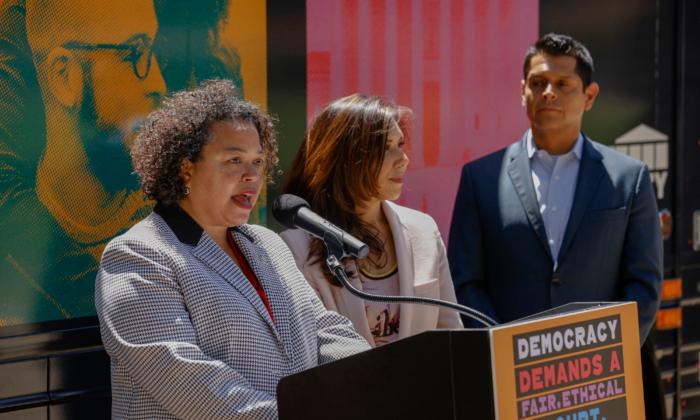California lawmakers in the Assembly approved on April 25 a bill that would revise existing law and permit lawmakers, their staff, and candidates to spend campaign funds on securing their homes and offices.
“Unfortunately, we have seen an increase in threats against public officials, especially women, and harassment against legislative staff who serve the constituents who elected us to office,” the bill’s author, Assemblywoman Mia Bonta, said in legislative analyses. “Ensuring the safety of candidates and elected officials is essential to protecting our democracy.”
Assembly Bill 2041 would allow eligible individuals to install electronic surveillance systems, hire private security, and purchase certain protective equipment—including tasers and pepper spray, among other things—but would exclude firearms.
Detailed records would be required, and those using campaign funds for such expenditures would have to reimburse the campaign or committee that provided the money once they are no longer serving the public.
The bill would eliminate a $5,000 cap previously set by the passage of Proposition 9—known as the Political Reform Act—passed by voters in 1974 and would expand the definition of eligible individuals to include staff members. Amendments to the voter-approved measure require a two-thirds majority in both houses of government.
The legislative committee staff noted in analyses that the bill “significantly broadens” existing regulations by allowing the use of campaign funds to protect family members and staffers. Concern was also expressed regarding the elimination of the spending cap, suggesting that an increase could be considered instead.
Additionally, current law requires specific threats reported to law enforcement before funds are used for security, while the proposal allows for such when “threats arise” and does not require supporting documentation from legal authorities.
The author said the bill is necessary because of threats and a growing number of protests targeting policy makers—singling out former President Donald Trump as instigating such an environment by questioning the integrity of the electoral process.
“The political rhetoric across the country is becoming increasingly alarming, with lawmakers from local school boards to congressional leaders constantly receiving threats,” Ms. Bonta said. “When Trump took office as president and spread lie after lie about how the election was stolen, his radicalized followers took it upon themselves to confront public officials, and even their family members, by any means necessary, with the Big Lie justifying the violence.”
She argued that the prospect of political violence is threatening democratic functions.
“When reactionary elements fan the flames of violence, they are putting candidates and elected officials squarely in their sights,” Ms. Bonta said. “It is an honor to hold a public office and serve our community. But this honor should never be overshadowed by the harassment and threats against ourselves, our families and our children.”
Supporters of the proposal agreed and pointed to a 2023 report from the California Women’s List—a political action committee supporting pro-choice Democratic women candidates—demonstrating that nearly two-thirds of female candidates experienced harassment while campaigning as evidence that female elected officials suffer from disproportionate levels of intimidation.
“These threats not only undermine our democratic principles but also deter qualified individuals from seeking public office, thus weakening the diversity and representation within our government,” Courage California—a Los Angeles based nonprofit—said in legislative analyses. “AB 2041 presents a comprehensive solution to address these challenges by expanding access to security measures and removing existing barriers.”
Critics of the bill suggest that policies originating in the Legislature are detrimental to public safety and that lawmakers are attempting to shield themselves from the impacts of their own decisions.
“[The] privileged class can have protection, but the citizens can’t enjoy the safety that comes from fully funded police departments and prosecution of criminals to the full extent of the law,” one Californian posted April 25 on X.
A prior attempt to enact such legislation—Assembly Bill 37 introduced in 2023 by the same author—was vetoed by California Gov. Gavin Newsom last year because the measure was overly broad.
“While I support the author’s intention, the bill as drafted does not clearly define ‘security expenses,’” Mr. Newsom wrote in his veto letter. “Without more guidance on what would or would not be allowed as a legitimate use of campaign funds, this bill could have unintended consequences and could lead to use of political donations for expenditures far beyond what any reasonable donor would expect.”
He advised at the time that donors’ intentions should be respected and protected by candidates.
“We must ensure political donations are utilized in a manner consistent with their intended purpose,” Mr. Newsom said.
The new bill passed the Assembly with an urgency clause and if ultimately approved by the Senate and signed by the governor, would become law immediately.







